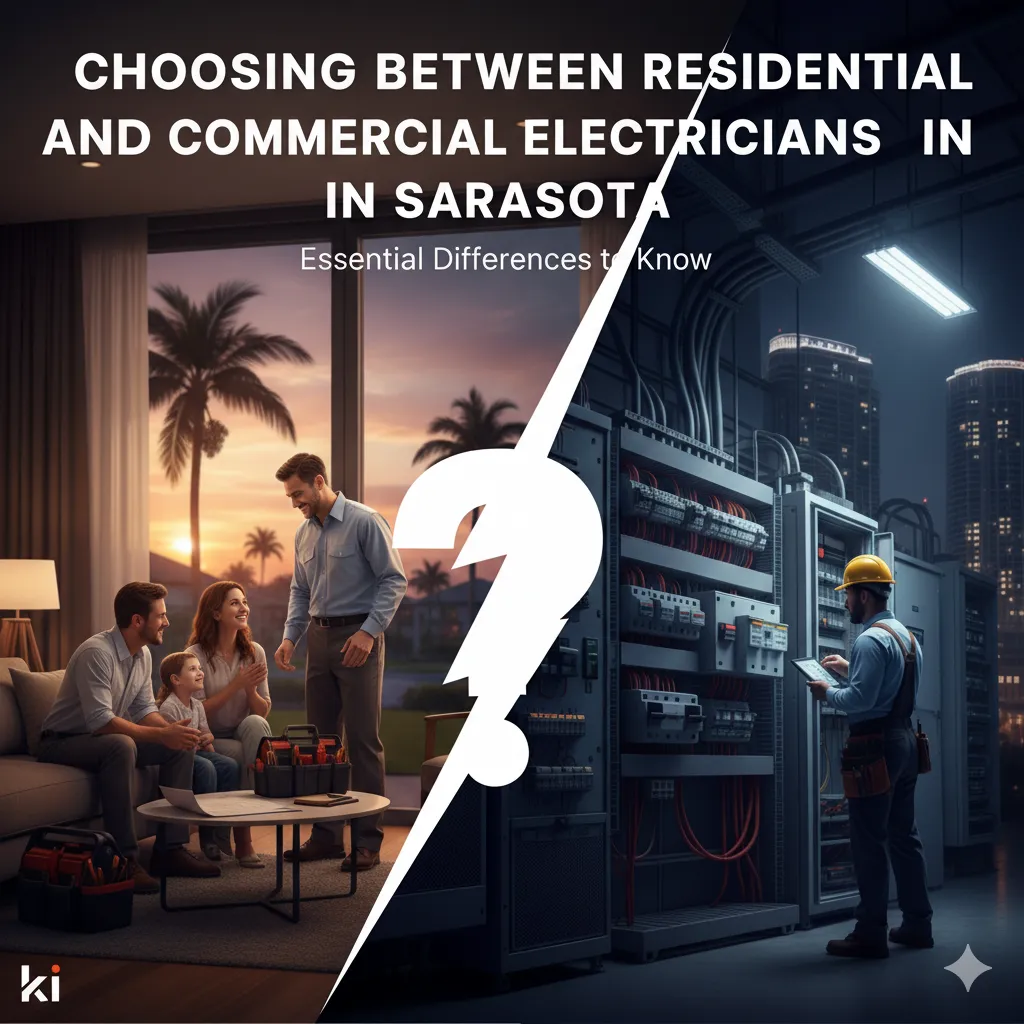
Choosing Between Residential and Commercial Electricians in Sarasota: Essential Differences to Know
Choosing Between Residential and Commercial Electricians in Sarasota: Essential Differences to Know
When it’s time to hire an electrician in Sarasota, understanding the key differences between residential and commercial electricians is essential to making the right choice. Although both professionals work with electrical systems, their training, expertise, work environments, and project requirements vary significantly. This guide explains these differences and offers insights to help Sarasota homeowners and business owners select the electrician best suited for their specific needs.
What is a Residential Electrician?
Residential electricians specialize in working on electrical systems in single-family homes, apartments, condos, and other residential properties in Sarasota. Their expertise covers single-phase electrical systems, which are typical in households.
Residential Electrician Responsibilities:
Installing, repairing, and upgrading wiring, outlets, switches, and lighting fixtures in homes
Troubleshooting common electrical issues such as power outages, circuit breaker trips, and faulty outlets
Upgrading electrical panels to handle increased household demand
Installing home safety devices such as smoke detectors and surge protectors
Rewiring older homes to meet current safety codes and standards
Residential electricians focus on ensuring the safety and comfort of the home's occupants. They are trained to work carefully within living spaces, minimizing disruptions while maintaining high safety standards.
What is a Commercial Electrician?
Commercial electricians in Sarasota work on larger, more complex electrical systems found in businesses, retail spaces, office buildings, schools, and industrial facilities. Unlike residential electricians, they deal primarily with three-phase power systems designed to meet higher power demands.
Commercial Electrician Responsibilities:
Designing, installing, and maintaining electrical systems for commercial buildings and industrial facilities
Handling large-scale wiring projects involving conduit bending and heavy gauge wiring
Installing specialized equipment such as generators, industrial lighting, and HVAC electrical controls
Ensuring compliance with commercial building codes, safety regulations, and energy efficiency standards
Responding to emergency electrical repairs to minimize business downtime
Commercial electricians must understand intricate electrical systems and regulations that apply specifically to commercial and industrial properties.
Key Differences Between Residential and Commercial Electricians
Training and Certification
While both electrician types require foundational training and licensing in Florida, their educational pathways diverge:
Residential electricians complete apprenticeships focused on residential wiring, customer service, and home-specific electrical codes.
Commercial electricians undergo more extensive training in large-scale electrical systems, blueprint reading, three-phase power, and commercial code compliance.
Work Environment
Residential electricians work primarily in homes, often navigating tight spaces like attics and crawl spaces while respecting homeowners' living environments.
Commercial electricians operate in larger, sometimes active business environments such as retail stores or office complexes, often working during non-business hours to avoid disruptions.
Job Complexity and Systems
Residential electrical systems generally operate on lower voltage (120-240 volts) single-phase power, while commercial systems can involve three-phase power and higher voltages exceeding 240 volts.
Commercial electricians manage complex wiring assemblies and heavy-duty equipment requiring more advanced skills.
Pricing Models and Project Scale
Residential electrician projects are typically smaller, with pricing geared towards homeowners' budgets.
Commercial projects are larger and more complex, often involving contracts and higher costs due to the scale and technical requirements.
Why Choosing the Right Type of Electrician Matters in Sarasota
Hiring the wrong type of electrician can lead to inefficiencies, higher costs, and safety risks. For example, while a residential electrician is well-suited for home repairs and upgrades, they may not have the expertise to handle commercial electrical systems safely and up to code. Conversely, a commercial electrician might charge higher rates and use less efficient methods for smaller residential projects.
When to Hire a Residential vs. Commercial Electrician
Hire a residential electrician for: home renovations, outlet installations, circuit repairs, lighting upgrades, and panel replacements in living spaces.
Hire a commercial electrician for: new commercial construction wiring, industrial machinery installation, large-scale lighting systems, fire alarm system installation, and building-wide electrical maintenance.
Conclusion
Understanding the essential differences between residential and commercial electricians in Sarasota will help you select the right professional for your electrical needs. Whether it’s safeguarding your home’s electrical system or ensuring your business’s power infrastructure operates optimally, choosing a specialist with the right experience, training, and local knowledge guarantees safety, compliance, and cost efficiencies.
If you need additional information or tailored advice for your Sarasota electrical project, consulting with licensed electricians specialized in your project type is always recommended.
This article is optimized with SEO keywords such as "choosing residential commercial electrician Sarasota," "difference between residential and commercial electricians," "Sarasota electrician services," and natural language phrasing to maximize search relevance.
If you require, I can also create a detailed FAQ or comparison chart for better clarity.